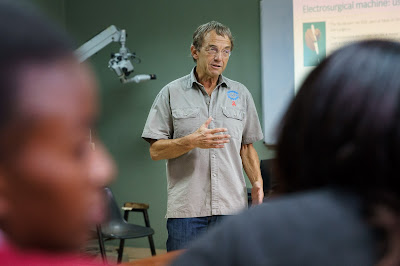90% of blindness occurs in Low and Middle Income Countries (LMICs), the places that are least prepared to deal with this burden, but about 90% of the research funding goes to High Income Countries (HICs).
At Queens University Belfast, as part of a rapidly evolving
global health scene, there is much to celebrate and be excited for in terms of
the progress being made to change this statistic. As an ophthalmologist, who
has spent over ten years in China developing appropriate approaches to vision
impairments and diseases, it is an exciting time to be in Northern Ireland and to
be part of pioneering global vision programmes which are affecting real change
both here and throughout the rest of the world.
As part of this, we have a number of projects underway
including; a new Global Health MPH to ensure that there is improved training in
global health and our Global Health Symposium, now in its third year, which continues
to bring in diverse participants from all over the world, including the
Republic of Ireland. The Global Challenge Research Fund has also enabled colleagues
at the Queen’s Centre for Public Health to apply for ‘research aid’ to develop
models for Cervical Cancer screening in Vietnam and look into new approaches to
diabetic eye disease in China.
Collaboration on these projects has gone beyond Queen’s and
has brought together experts from all over the globe, to ensure that the
programmes are both clinically focused and needs-driven.
A global model
As the Sustainable Development Goals (SDGs) illustrate, so
many global issues from health to education interconnect and create valuable
synergies. In this vein, the implications of poor eye health are far reaching. Diabetic
eye disease, for example, is the leading cause of global blindness for those in
their working years and is a fast-growing problem in LMICs where the loss of
the main breadwinner in a family can plunge them into extreme poverty.
The NHS is an acknowledged global leader in universal health
coverage and as seen in numerous schemes can contribute to the furthering of
the SDGs. More specifically the NHS’ work on screening for diabetic eye disease
is a leading example of excellent practice. The models and techniques employed
by the NHS screening program are widely available on the internet, allowing anybody
in any country to understand and learn from the practices employed in the UK. At
the same time, through working with our counterparts overseas on eye health
programmes, we continue to learn new insights in areas such as school vision
screening, which can further improve the quality of care in Northern Ireland
and the rest of the UK.
Our collaborations incorporate many different actors. Currently,
with Orbis International, we are developing and scaling-up models of diabetic
screening based on NHS practice and modified for low-resource settings. The
first of these will be rolling out soon in Vietnam, and we expect more later in
Africa, Latin America and Asia.
We have also been working on incorporating NHS software. Working
with Health Intelligence, a provider of NHS image grading software, we are implementing
a model for the Vietnam programme through the creation of a version of the
software specifically designed for use in LMICs. Thus, there are so many ways
and opportunities in which we can apply through an adaptive approach these NHS
models in ways that are appropriate for low resource settings.
The need: global and
local
It has become apparent that to think of ‘global health’
doesn’t mean to exclude underserved areas that happen to be in higher income
countries. At Queen’s, we also realise the need at home and are working to
combat the disparities in care. We continue to work to understand the problems
within Northern Ireland, especially as some of the postcodes in the country are
among the poorest and most deprived in the UK.
As a response to this we have been working with a group of
over a dozen institutions, as part of the Developing Eyecare Partnerships (DEP)
project, a programme developed by the NHS with the goal of developing partnerships
to create more efficient models of care We are using research to try to further
improve the quality, efficiency and equity of care in Northern Ireland for
diabetic eye disease, cataract surgery and school vision screening.
NHS as a driving
force
There is no question then that the leading NHS institutions
have been important drivers in our thinking, both here in Northern Ireland and
globally. My work continues to focus on bringing equity of access not just for
eye care but also as a result for communities more widely. Improved eyesight
also brings wider world of educational and work opportunities in low-resource
settings.
It is truly inspiring to be a part of the growing global
health arena in Northern Ireland. There is a huge sense of momentum, driving
forward programmes both in LMICs and in deprived areas of our own country.
Being part of initiatives which use our own NHS models to improve care across
the globe, whilst highlighting improvements and new initiatives which we can
use to improve care throughout the whole of the UK, is extremely exciting and I
am looking forward to what is to come.
Professor Nathan Congdon,
- School of Medicine, Dentistry and Biomedical Sciences
- Centre for Public Health
- Queens University Belfast



